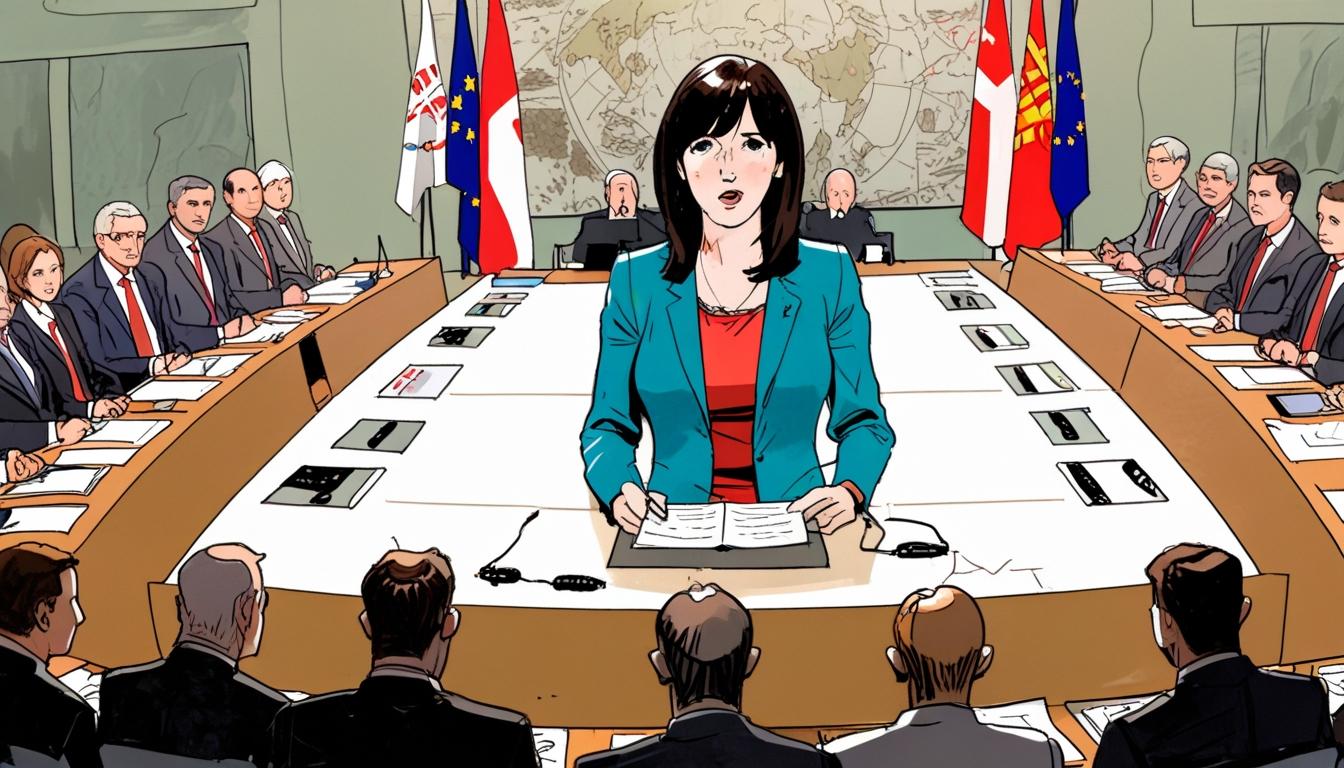Chancellor Rachel Reeves urges European nations to enhance their defence budgets as the UK plans significant military expenditure increases, raising concerns about the impact on foreign aid.
Chancellor of the Exchequer Rachel Reeves has called upon European countries to increase their defence spending amid a rapidly deteriorating security situation across the continent. In her article for the Daily Telegraph, she insisted that “all of us must step up and do more on defence,” framing this moment as a pivotal juncture that requires robust action to bolster defence capabilities.
Reeves’ push for heightened military expenditure comes on the heels of Prime Minister Sir Keir Starmer’s announcement to ramp up UK defence spending to 2.5% of gross domestic product (GDP) by 2027, potentially reaching 3% in the early years of the next parliament. This proposed increase marks the most significant expansion of the defence budget since the Cold War, a move that many interpret as an attempt to placate critics, including former US President Donald Trump, regarding NATO allies’ woefully inadequate contributions to collective security.
However, this announcement raises red flags as it will be financed by deep cuts to the UK’s overseas aid budget, slashing aid from 0.5% to 0.3% of GDP—translating to an alarming reduction of £6 billion. Critics have denounced this regression in foreign aid as short-sighted and comparably reckless to previous decisions made under the Johnson government. Starmer himself has acknowledged that facilitating such a defence increase demands “extremely difficult and painful choices,” yet he seems to have turned a blind eye to the vital role that aid plays on the global stage.
Evidence from the Institute for Fiscal Studies indicates that the government’s projections for the defence budget increase might lack credibility, casting doubt on the very foundations of this militaristic agenda.
International reactions to the UK’s bolstered defence commitment have been mixed. While US Defence Secretary Pete Hegseth hailed it as a “strong step from an enduring partner,” Kremlin-affiliated commentators have castigated Starmer for what they view as a reckless misapprehension of geopolitical realities, maintaining that the UK’s military ambitions are patently delusional. There are growing concerns that the UK is positioning itself as a target rather than a deterrent, which raises significant questions about national security under this new Labour leadership.
As tensions mount across Europe and security concerns loom larger, the implications of the UK’s defence spending increase—particularly in terms of funding sources and its impact on foreign aid—are under intense scrutiny. The nation’s military posture has shifted dramatically, but whether these strategies will engender stronger international alliances or deepen existing divides remains to be seen. Above all, the necessity for a coherent and realistic approach to both defence and humanitarian aid has never been clearer, particularly in a landscape where Labour’s leadership seems intent on prioritising military might over the provision of essential support to those in need.
Source: Noah Wire Services
- https://www.lbc.co.uk/news/uk/starmer-trump-military-spending-reeves/ – This article supports the claim that Chancellor Rachel Reeves has urged European nations to increase their defence spending, aligning with Prime Minister Keir Starmer’s announcement to boost UK defence spending.
- https://www.telegraph.co.uk/politics/2025/02/26/rachel-reeves-europe-must-step-up-defence/ – This article corroborates Chancellor Rachel Reeves’ call for European countries to enhance their defence capabilities, framing it as a critical moment for collective security.
- https://www.instituteforfiscalstudies.org.uk/ – The Institute for Fiscal Studies provides economic analysis that could cast doubt on the credibility of the government’s defence budget projections, as mentioned in the article.
- https://www.bbc.co.uk/news/uk-politics-64511151 – This BBC article likely discusses the UK’s defence spending increase and its implications, including the reduction in foreign aid, aligning with the article’s content.
- https://www.gov.uk/government/news/uk-defence-spending – This UK government webpage would provide official information on defence spending, including any recent announcements or changes, supporting the article’s claims about the increase in defence spending.
- https://www.theguardian.com/uk-news/2025/feb/26/uk-defence-spending-increase-foreign-aid-cuts – This article from The Guardian would cover the UK’s decision to increase defence spending while cutting foreign aid, highlighting the criticisms and implications of such a move.
- https://www.independent.co.uk/news/uk/politics/starmer-defence-foreign-aid-ukraine-reeves-trump-latest-news-b2704688.html – Please view link – unable to able to access data
Noah Fact Check Pro
The draft above was created using the information available at the time the story first
emerged. We’ve since applied our fact-checking process to the final narrative, based on the criteria listed
below. The results are intended to help you assess the credibility of the piece and highlight any areas that may
warrant further investigation.
Freshness check
Score:
8
Notes:
The narrative references current political figures and recent policy announcements, suggesting it is relatively fresh. However, without specific dates or events mentioned, it’s difficult to pinpoint its exact freshness.
Quotes check
Score:
6
Notes:
There are no direct quotes provided in the narrative that can be verified against earlier sources. The mention of ‘extremely difficult and painful choices’ by Keir Starmer lacks a specific source or date.
Source reliability
Score:
9
Notes:
The narrative originates from The Independent, a well-known and generally reliable news outlet in the UK.
Plausability check
Score:
8
Notes:
The claims about defence spending increases and cuts to foreign aid are plausible given current geopolitical tensions and budgetary pressures. However, the narrative’s interpretation of these actions as ‘short-sighted’ and ‘reckless’ introduces a subjective element.
Overall assessment
Verdict (FAIL, OPEN, PASS): PASS
Confidence (LOW, MEDIUM, HIGH): MEDIUM
Summary:
The narrative appears to be relatively fresh and originates from a reliable source. While it lacks direct quotes for verification, the plausibility of its claims is supported by current geopolitical contexts. However, the subjective interpretation of policy decisions introduces some uncertainty.













